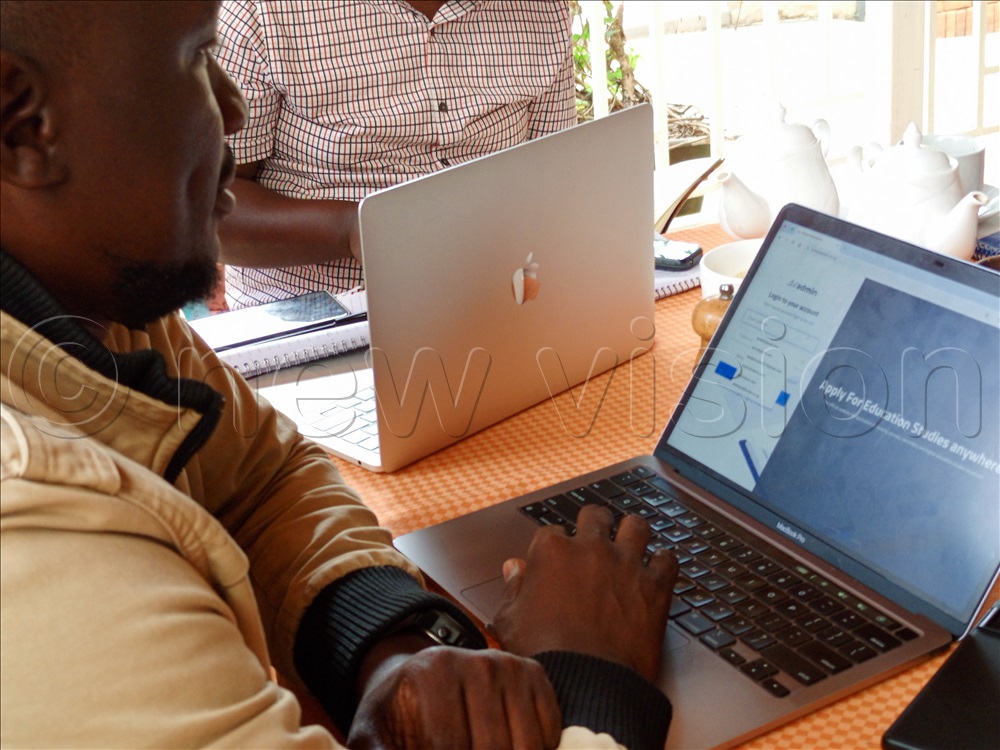Govt urged on policy reforms to boost survival of local innovations
Emmanuel Kakaire, a tech innovator and team lead at DCode Dynamics, argues that policy-related constraints are preventing innovators from turning ideas into scalable solutions.
Emmanuel Kakaire, a tech innovator and team lead at DCode Dynamics, says policy barriers are holding back innovators from scaling their ideas. He made these remarks at the launch of SchoolAdmin.co—a web-based school management portal that simplifies fee payments and student applications—held Tuesday at Mosa Courts, Kampala. (Photos by John Masaba)
________________
Uganda's tech sector is brimming with talent, but a lack of support and systemic barriers are stifling promising ideas, according to local innovators.
They are, therefore, urging policymakers to move beyond rhetorical support and create a truly enabling environment for a sustainable tech ecosystem.
Emmanuel Kakaire, a tech innovator and team lead at DCode Dynamics, argues that policy-related constraints are preventing innovators from turning ideas into scalable solutions.
"The first constraint every innovator faces is monetary resources—and our policies don't yet address that challenge," Kakaire says.
He was speaking at the launch of SchoolAdmin.co at Mosa Courts in Kampala city on Tuesday, September 2, 2025. SchoolAdmin.co is a web-based school management portal that streamlines fee payments and student applications.
Kakaire noted that while some innovations have found success, many equally promising projects stall at the Minimum Viable Product (MVP) stage due to a lack of targeted government support.
"Most IT solutions need infrastructure like cloud servers, which are expensive and billed hourly," he said.
"Without policy-driven support, such as subsidised hosting or innovation grants, many ideas simply collapse."
Kakaire stressed that the MVP stage is a critical point for government intervention. He believes that by supporting well-established MVPs, the Government could attract partnerships, investment and national impact.
Kakaire also highlighted a significant skills gap and a lack of structured support.
"Some innovators have brilliant ideas, but they don't know how to run them."
A man demonstrates how the web-based portal SchoolAdmin.co works. Ugandan innovators say that while some tech solutions have succeeded, many equally promising projects stall at the Minimum Viable Product (MVP) stage due to limited support.
He emphasised that innovators need support on writing proposals, forming partnerships, and scaling up, framing these as policy issues rather than personal failings.
He also called for policies that integrate mentorship and emotional resilience, noting the burnout and isolation many young innovators face. "Innovators need emotional support and a community—not just funding," he stated.
Lack of awareness
Another major barrier is the lack of awareness and enforcement of intellectual property (IP) rights. Kakaire warned that without adequate protection, innovators risk having their ideas stolen by those with more resources. This problem is compounded by a cultural mistrust of local talent.
"Investors and institutions often prefer foreign solutions—even when locals are building equally competitive or better tools," he said.
To address this, he urged the government to implement preferential procurement and local content policies within national development frameworks.
As a tangible example of what local talent can achieve, Kakaire highlighted the School Admission System. The platform allows students to apply to any registered school online, simplifying a process that was previously tedious and manual.
"This system prepares students for a future where everything is online," he said. The platform is free for users, with application fees paid directly to the schools.
Global ranking
Uganda's position on the global stage reinforces Kakaire's concerns. According to the Global Innovation Index 2022, Uganda ranks 119th out of 132 countries, and 13th in Sub-Saharan Africa. The report points to weak research-industry linkages and low IP utilisation as key bottlenecks.
In a recent move, Dr. Aminah Zawedde, Permanent Secretary at the Ministry of ICT and National Guidance, announced government efforts to help innovators patent their solutions. While the government's Third National Development Plan (NDP III) positions innovation at the centre of economic transformation, innovators like Kakaire believe more targeted implementation is urgently needed.
Kakaire's message is clear: Uganda has the talent and ideas, but without structured support, innovation won't survive.
"Government must step in—not just with funding, but with systems that build capacity, offer mentorship, protect innovators, and create space for local solutions to grow," he concluded.